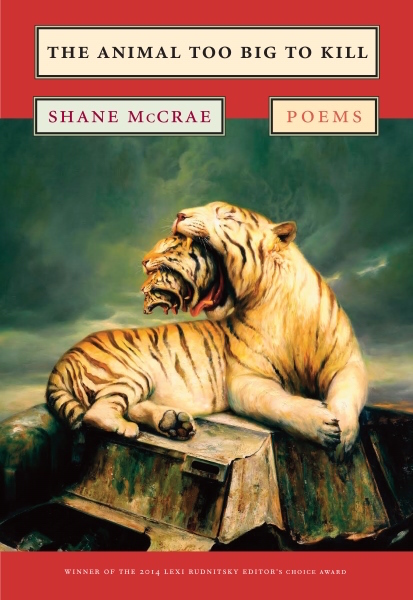Shane McCrae in Conversation at 32Poems

Hot off the internet-presses today is Cate Lycurgus's interview with Shane McCrae at 32Poems. Last year Persea Books published McCrae's latest collection The Animal Too Big to Kill, which is exactly where Lycurgus and McCrae begin their conversation:
Cate Lycurgus, Interviews Editor: At the risk of being obvious, I’ll begin with your latest collection and its title poem, “The Animal Too Big to Kill.” The poem remixes the dynamics of agency and faith, speaking both as a one who has the power to refuse to participate in killing and also as a “creature that requires signs Lord from You” with the subsequent suggestion that “killing the animal too big to kill would be a sign.” Can you speak to some of the animals “too big to kill” and, in absence of that sign, how the poems offer a way to live with them, tackle them, tame them, swallow them?
Shane McCrae: I was thinking, at the time, about how the body of every carnivore is a walking graveyard—which sounds dramatic, I know—and about what an animal made of all the animals I’ve ever eaten would look like, since traces, or traces of traces, of those animals are inside of and also constitute my body. The animal would certainly be much larger than I am, and I imagine larger than any animal that has ever lived, and I carry its ghost and possibility with me. I don’t know that the poems offer ways to swallow such animals, or to tame them, or even to tackle them, but I hope the poems are examples of efforts to live with them. One cannot choose but to live with them, and one cannot write without them even if one doesn’t acknowledge them—they are in the blood that feeds the brain and body and therefore in every word the brain and body make. If I say “Hello” to you, I speak the animals that made me. Hopefully, the way the poems offer to live with them is this: One lives with them by living—they are not a problem to be overcome or accommodated; they are one’s own being.
McCrae goes on to talk about hunger, desire, and privilege: "I think we abdicate our responsibilities to each other when we don’t acknowledge the implications of our own hungers. It is not so much that our hungers make claims upon us, but that love does, and if we are to love each other we must reckon with our hungers, because our hungers are strong enough to interfere with our love, and, indeed, to override it." Then he elaborates on those themes through his own writing practice with a rigorous look at punctuation (or the abandoning of it) and the pronoun "we." Lycurgus also wonders what poetry has done for McCrae, which we find out (surprisingly or not) is a lot!
SM: Oh gosh. I would feel embarrassed listing the things poetry has done for me. Poetry has given me my entire life. For one thing, I would never have met my partner, Melissa, if not for poetry, nor would I have any of my children. I certainly wouldn’t have my job, nor would I love to read as much as I do. And I wouldn’t have my mind; I wouldn’t have my self. And I’m so happy to be a part of the family I’m a part of, and to work the job I work, as the person I am. Poetry has made me perceive the world the way I perceive it. Poetry’s power is both local and limitless—it happens person by person, but it often reverberates in and through each person in such a way that the people poetry happens with (it’s always with, never to) become new people, and whatever they do next and forever they do as new people. Poetry is a revolutionary force, because it is a force for renewal.
Get your weekend started right by heading to 32Poems for all of it.


